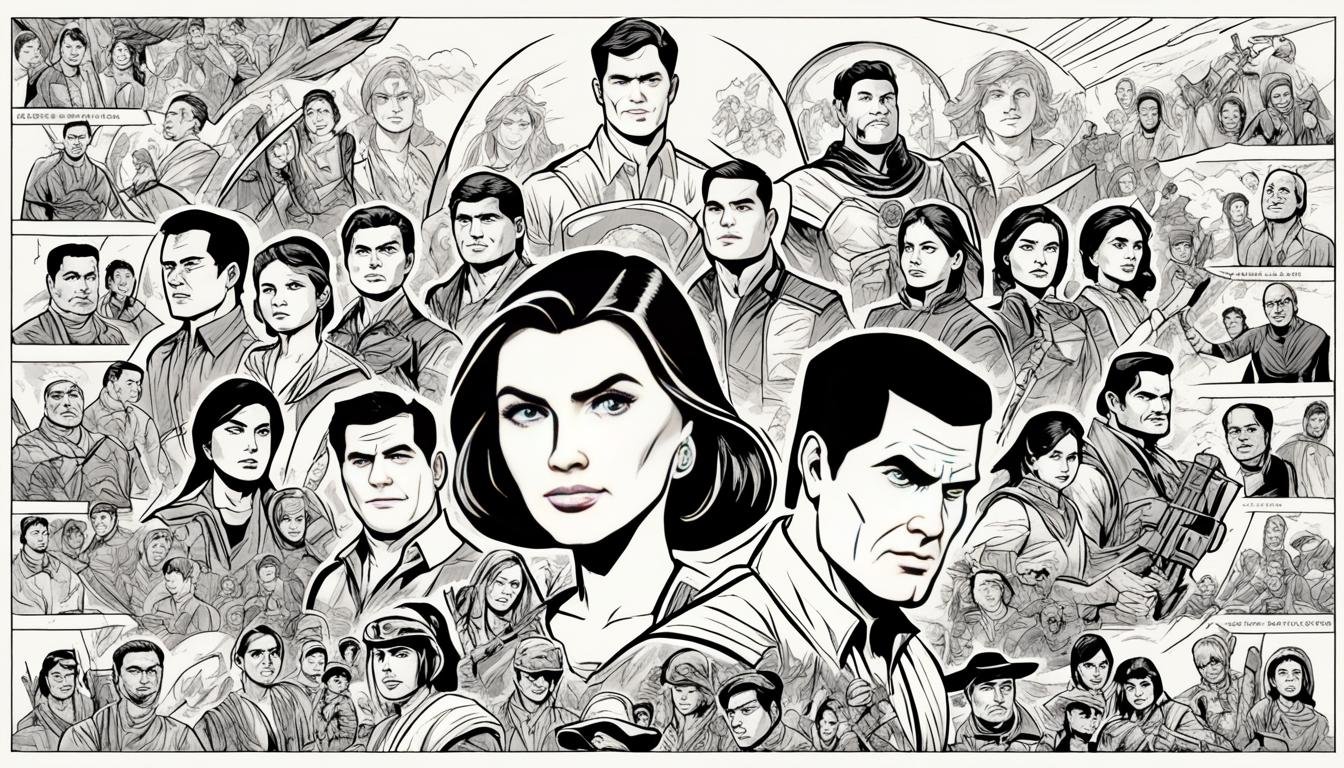The Philippines has a rich history of heroes fighting for freedom and equality. But how much did these heroes actually know each other?
Were famous heroes like Jose Rizal and Andres Bonifacio friends or rivals? Did they work together or follow different paths?
This article will look into the friendships and connections between Philippine heroes. We’ll see if they knew each other and shared the same dreams and goals. Their stories will show you the powerful impact they made on the country.
Key Takeaways:
- Philippine heroes played pivotal roles in the fight for independence, justice, and equality.
- Exploring the relationships and connections among heroes reveals a deeper understanding of their struggles and motivations.
- Uncovering whether heroes like Rizal and Bonifacio knew each other sheds light on the extent of their influence and collaboration.
- The stories of these heroes inspire and shape the collective identity of the Filipino people.
- Recognizing and honoring heroes helps preserve Philippine history and inspire future generations.
The Undeclared National Heroes of the Philippines
The idea of undeclared national heroes is key to the Philippines’ history and culture. Even without official titles, some figures stand out as heroes. They played huge roles in building the nation and shaping its history.
These unsung heroes gave everything for the Philippines. Their fight for freedom and their contributions to the nation’s identity are unforgettable. They are remembered with respect by Filipinos everywhere.
These heroes showed true bravery, selflessness, and perseverance. They were not just soldiers; they were writers, artists, and ordinary people. Their efforts moved the Philippines towards a better future.
These heroes have a special place in the nation’s heart, even without official titles. They are symbols of hope and national pride. Their lives inspire those who come after them.
| Name | Field of Influence | Contributions |
|---|---|---|
| Jose Rizal | Literature, nationalism | Authored novels and essays that contributed to national identity and inspired rebellion. |
| Andres Bonifacio | Revolutionary leadership, social justice | He started the Katipunan and led the fight for freedom against the Spanish. |
| Melchora Aquino | Revolutionary support | She helped revolutionaries by offering safety and resources. |
| Marcelo H. del Pilar | Journalism, political activism | He published papers that called for reforms and changes. |
Many heroes like these have made their mark in the Philippines. Their valor and sacrifice are not forgotten. They remain at the heart of Filipino heroism.
“The actions of these unsung heroes continue to inspire and guide us in our pursuit of a better future. Their bravery and dedication serve as a reminder of the resilience and strength of the Filipino people.”
The legacy of these heroes keeps the Filipino spirit strong. Their stories highlight the best of the Filipino character. Their efforts to shape the nation are a testament to heroism in the Philippines.
We’ll now explore the lives of specific national heroes. We’ll look closely at their achievements and how they impacted the Philippines deeply.
Rizal and Bonifacio: Revered National Figures
Jose Rizal and Andres Bonifacio play major roles in Philippine history. Their stories, accomplishments, and impact on the freedom fight and national identity are key. They have both greatly influenced the country’s course.
Rizal was a talented writer. He used his skills to show the world the problems under colonial rule. Books like Noli Me Tangere and El Filibusterismo started a revolution. Many people were moved to fight against the Spanish.
Bonifacio was a revolutionary leader. He founded the Katipunan to lead the fight against Spain. His speeches and work for the Filipinos inspired many. They called him “Father of the Philippine Revolution” for his dedication.
“The hero is the one who kindles a great light in the world, who sets up blazing torches in the dark streets of life for men to see by.” – Felix Adler
Although Rizal and Bonifacio were very different, they wanted the same thing. They fought to free the Philippines from foreign rule. They showed great bravery, selflessness, and love for their country.
Learning about Rizal and Bonifacio tells us a lot about Filipinos’ struggles and dreams. Their strong dedication to freedom and their lasting influence show the true spirit of the Filipino people.
To learn more about what makes a national hero in the Philippines, check out this informative article.
Unsung Heroes and the Criteria of Heroism
Popular figures like Jose Rizal and Andres Bonifacio often take the spotlight. But countless unsung heroes also shaped the Philippines. They did not get the same fame, yet they made significant contributions.
Definition of Filipino Heroism
Filipino heroism is more than bravery or great deeds. It’s about serving the nation and its people. It includes selflessness, sacrifice, and working for the common good.
Unsung heroes fit this idea perfectly. They work to make life better for others and to move their nation forward. They might fight against wrongs, stand for justice, or support education and culture.
Contributions to Nation-Building
The work of unsung heroes is vital in building our nation. From local movements to high-minded achievements, they’ve done a lot. Their work helped lay the foundations for today’s Philippines.
In fields like education, arts, health, and community work, they’ve excelled. Their goal was to better their communities and help other Filipinos. This has helped the nation grow and develop.
Recognizing these heroes is important. By sharing their stories and celebrating their work, we can inspire others. This way, we encourage them to work for the nation’s betterment too.
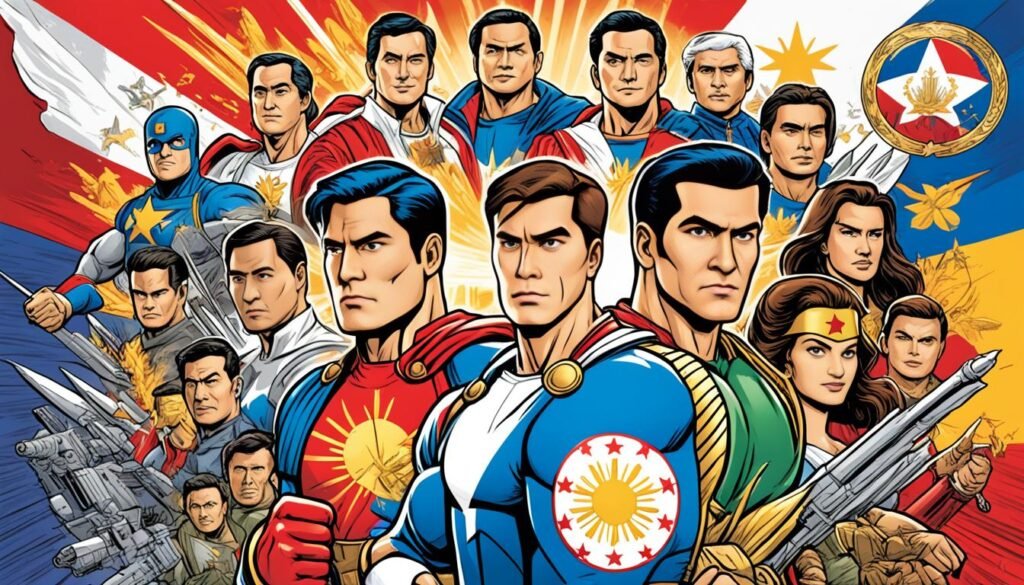
Philippine Heroes and Their Fields of Influence
Philippine heroes are remembered in many areas, shaping the country’s history. They inspire us even today. Here, we will look at two famous heroes and the fields they impacted.
The Rebel: Andres Bonifacio’s Struggle
Andres Bonifacio is a national hero for his work as a rebel. He led the fight against the Spanish and social wrongs. His dream was of a united Philippines without foreign control.
Bonifacio’s main work was to gather people and start a revolution. He led the Katipunan, a group aiming to end Spanish rule. His strong leadership began important changes for the country.
The Intellectual: Jose Rizal’s Pen
Jose Rizal is also deeply respected for his ideas and writings. He critiqued Spanish rule in what he wrote. As a novelist, poet, and essayist, his works were powerful.
His books, like “Noli Me Tangere” and “El Filibusterismo,” questioned social norms. They showed the hard life under the Spanish. Rizal’s words aimed to make Filipinos more aware and united.
His writings started important conversations and built a sense of pride. They were crucial for creating a national identity. Rizal changed Philippine literature and culture deeply.
In the end, many Philippine heroes made a lasting impact in their own ways. Andres Bonifacio’s fight and Jose Rizal’s wisdom are just two examples. Their work continues to influence and inspire the Philippines.
Protagonists of Freedom: Rizal and Bonifacio’s Ideals
Jose Rizal and Andres Bonifacio had a big influence in fighting for freedom. They deeply believed in the same things such as freedom, justice, and equal rights. But, they had different ways of reaching their goals.
Rizal, the brain behind the change, emphasized learning and peaceful actions. He used his writings, like Noli Me Tangere and El Filibusterismo, to show the bad side of Spanish rule. This opened the minds of Filipinos to their national identity.
Bonifacio, the fighter, wanted to be more direct in ending colonial rule. He started the Katipunan, a secret group, and helped start the Philippine Revolution. His actions shook the foundations of Spanish power in the country.
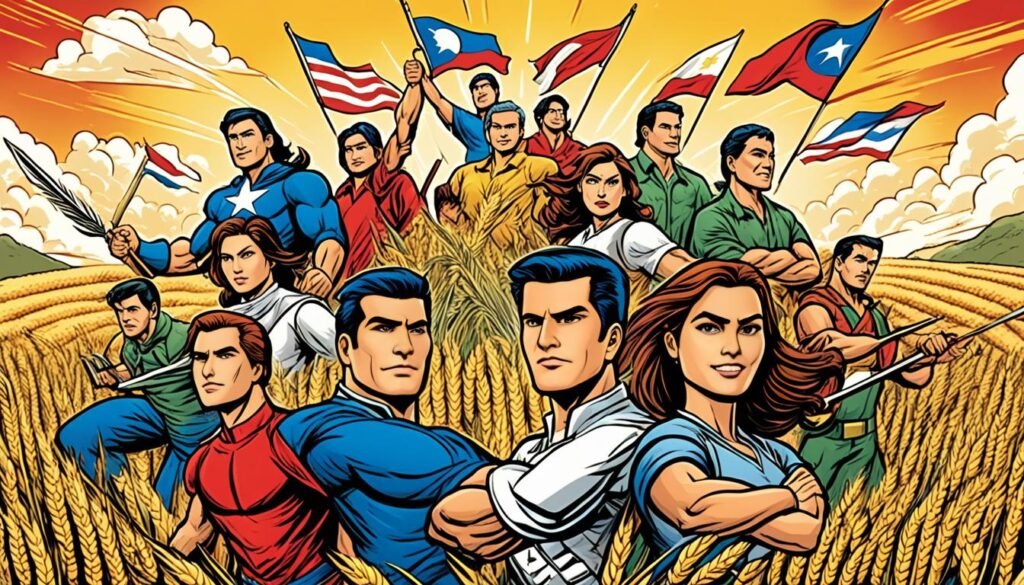
Rizal and Bonifacio both saw freedom as vital for the people of the Philippines. Despite their different methods, they both aimed for a free Philippines.
Rizal’s peaceful fight and writings helped begin the fight for freedom. He influenced many leaders in the future. Bonifacio, with his courage, showed that fighting for freedom was worth almost anything.
The work of Rizal and Bonifacio is still felt in the Philippines today. They showed the path to the goals of freedom, justice, and equality. They taught Filipinos to stand together and fight for a brighter tomorrow.
Link: Learn more about the Philippine Revolution
Revolutionary Affiliations: Katipunan and La Liga Filipina
In the quest for Philippine freedom, revolutionaries discovered power in their groups. The Katipunan, led by Andres Bonifacio, was one key group. Their goal was to end Spanish rule and set up a free country through secret methods.
Jose Rizal’s La Liga Filipina was also crucial. It wanted peace and reforms within the colonial system. But, after Rizal was imprisoned and exiled, La Liga ended. The Katipunan then took charge.
“The year 1892 saw the birth of both Katipunan and La Liga Filipina, two organizations that played crucial roles in the struggle for Philippine independence.”
The revolutionaries’ friendship was vital in fighting off the colonizers. They aimed to free the Philippines from Spain. This teamwork and love for their nation spurred their actions during the revolution.
Both groups formed because of the pain Filipinos felt under Spanish hold. They gave a place for people to gather, share ideas, and stand against oppression. This was a key moment in their fight for freedom.
https://www.youtube.com/watch?v=kz_u5H7Ta6E
The Katipunan and La Liga paved the road for the Philippine Revolution. Their strong belief in freedom sparked the nation to act. They inspired future Filipinos to demand their liberty.
To learn more about La Liga Filipina, visit this link.
The Personal Lives of Jose Rizal
Studying Jose Rizal’s personal life helps us understand this key figure in Philippine history better. Besides his famous works and his role as a national hero, he had a rich personal life. It was filled with academic achievements, deep thoughts, and close relationships.
Scholarly Endeavors and Ideological Pursuits
Rizal loved learning and spent his life pursuing knowledge. He earned degrees in fields like ophthalmology, literature, and philosophy. This shows his broad interests and how dedicated he was to learning.
He was smart and used his knowledge to speak out against injustices. His books, “Noli Me Tangere” and “El Filibusterismo,” highlighted the problems under colonial rule. They inspired Filipinos to fight against these issues.

Recounting Rizal’s Intimate Relations
Rizal was not only about learning; he also had important relationships. His love for Leonor Rivera is well known. She not only loved him but also was his inspiration for his writing.
He also valued his family and the deep connection they shared. His love for his siblings was evident. They all supported each other in their intellectual pursuits.
Other than family, Rizal made friends who shared his dreams for a better Philippines. Ferdinand Blumentritt was a close friend who shared Rizal’s vision. Together, they worked towards their goals.
Looking into Rizal’s personal life shows us a fuller picture of this great man. His academic and personal pursuits were equally important. Everything he did was driven by a deep passion for knowledge and change.
Learn more about Jose Rizal and his impact on Philippine history.
Andres Bonifacio: A Leader’s Profile
Andres Bonifacio is a famous leader in the Philippine revolution. He played a key role in the fight for independence. He was born on November 30, 1863, in Tondo, Manila. Bonifacio faced tough challenges due to poverty. Even with limited schooling, he had a big heart for justice. He wanted to free his people from Spanish rule.
Bonifacio loved to learn and improve himself. He read a lot about Filipino history and how to fight for freedom. This drive led him to oppose the Spanish rulers.
Bonifacio stood out as a leader because he was charismatic and determined. His strong commitment to freedom won him many followers. He started the Katipunan, a secret society, to fight against the Spanish.
“The love of one’s country is always greater than the love of one’s life.”
Bonifacio was all about fighting for freedom and equality. He led the people in revolts against the Spanish. He believed only armed struggle could win independence.
He met a tragic end in 1897 due to fights within the revolution. But, his dedication made him a hero for the Filipinos. He continues to inspire the nation today.
For more about Bonifacio and other Philippine heroes, check out here.
The Intersection of Rizal and Bonifacio’s Paths
Ever wondered if Jose Rizal and Andres Bonifacio ever met? While we don’t have proof that they did, their passion for Filipino freedom was powerful. Their individual efforts shaped the course of Philippine history. Let’s see how they might have inspired each other.
Jose Rizal was a brilliant mind and a passionate writer. He awakened national pride through his books, like “Noli Me Tangere” and “El Filibusterismo.” These works shed light on the Filipinos’ struggles under Spanish rule. Rizal’s fight for liberty inspired many, including Andres Bonifacio, in their quest for a free country.
Andres Bonifacio was a key leader in the fight against the Spanish, founding the Katipunan. His strong desire for freedom and his rallying cry to arms led to a significant movement. Bonifacio’s leadership helped start a revolution. Despite their different roles, both he and Rizal aimed for the same thing: independence for the Philippines.
Their paths might not have crossed physically, but morally and philosophically, they shared the same vision. Rizal’s thought-provoking works and Bonifacio’s bold actions stirred Filipinos’ hearts. Together, they pushed the country towards the freedom it so deeply craved.
“The heroes of the Philippines do not cease from influencing each other, even if they do not meet or know each other personally.” – Ambeth Ocampo
Rizal Avenue and various monuments are a lasting tribute to Rizal and Bonifacio’s impact. Their legacy is a beacon of hope and determination for Filipinos. It reminds us of the sacrifices made on the journey to independence.
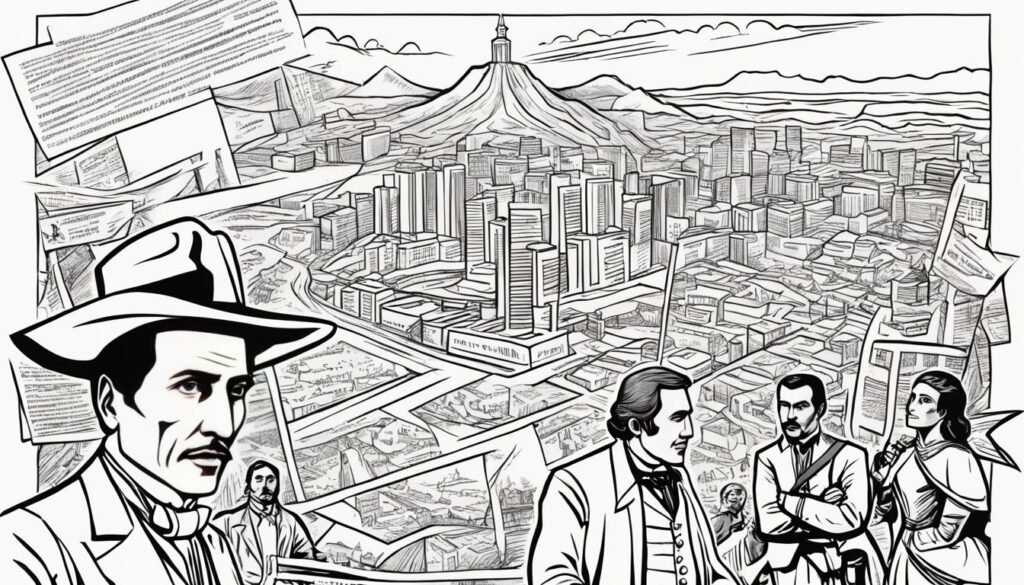
Understanding National Heroes’ Legacies
This part looks into how national heroes in the Philippines have made a big impact. It explores how they’ve influenced society and helped shape the country’s identity. We’ll see how their work lives on in literature, touching the hearts of many.
Literature and National Identity
The power of books is key to understanding our heroes’ legacy. These written tales keep alive the heroes’ stories and beliefs. They have influenced the way the nation thinks.
Novels, poems, and essays speak of the heroes’ challenges and victories. They let later generations feel close to what these heroes went through.
“Literature has the ability to transport readers through time and unlock the depths of human experiences. It serves as a vessel that carries the narratives of our national heroes, allowing us to comprehend their struggles, heroism, and unwavering dedication to the country.”
Jose Rizal’s works, “Noli Me Tangere” and “El Filibusterismo,” are towering achievements. They reveal the struggles of their time. And how Andres Bonifacio’s call for change still inspires today.
The Impact on Philippine Society
The heroes’ legacies deeply affect Filipino life. Their values and sacrifices are still guiding principles today. They stand as examples in education, politics, and the quest for fairness.
They have driven fights for justice and independence. Their bravery calls upon all Filipinos to love and care for their country. This has led to important social changes.
These heroes are more than just figures in old stories. They symbolize strength and bravery. We honor them in many ways, from holidays to statues. They remind us to be passionate and selfless, aiming for a better future.
A Hero’s Influence: From Culture to Rebellion
Heroes make a big impact on the culture and society of a place. They show us what’s important through their actions and what they stand for. Their influence is so strong that it can lead people to rebell against wrong and unfair things. This is very true for the heroes of the Philippines. They have helped shape the way people think and act for many years.
Across Filipino society, you can see how much heroes have affected people. Their stories are everywhere from books to songs to paintings and more. These heroes are more than just figures from the past. They are symbols of bravery, hope, and pride for their country.
Not only do they shape culture, but heroes also spark the idea of fighting back. Figures like Jose Rizal and Andres Bonifacio led the way in standing up to those who tried to control them. They showed their people the path to freedom and fighting for what they believe is right.
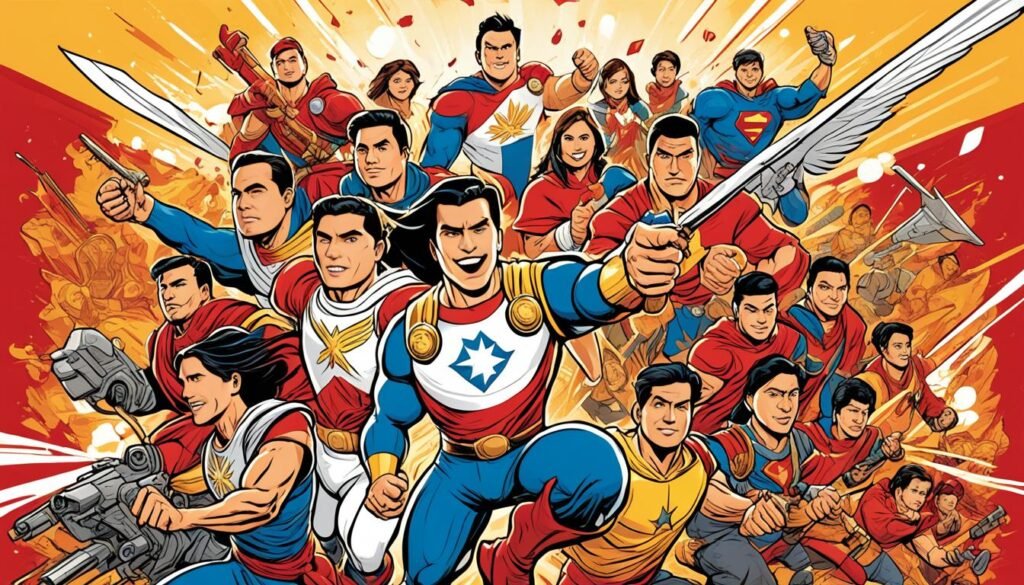
Symbols of Courage: Recognizing Filipino Valor
Filipino history is full of symbols that show courage and bravery. They inspire people to stand for their beliefs. These symbols remind us of the bravery and strength of the Filipino people when faced with tough times. For example, the Philippine flag and stories of national heroes are deeply meaningful to Filipinos. They increase their pride and connection to their country.
https://www.youtube.com/watch?v=gQQ65fsDBug
The Philippine flag is a powerful symbol of courage. It shows the never-give-up attitude of Filipinos. Its elements mean a lot: white stands for equality and friendship, blue for peace and justice, and red for love of country and heroism. The flag reminds everyone of the sacrifices made for freedom and independence.
The Katipunan flag was an important symbol during the Philippine Revolution of 1896. Also called the “Masonic flag,” it flew during the fight against Spanish rule. It showed the rebels’ unity and bravery in seeking freedom.
Statues and monuments of Filipino heroes are across the land. They honor people like Jose Rizal and Andres Bonifacio. These heroes fought for freedom and justice. Their stories inspire Filipinos today, showing a path of hope for the future.
Sometimes, it’s ordinary people who show great courage. For instance, those who save lives during disasters. Their bravery and selflessness are examples of the Filipino spirit.
“Courage doesn’t always roar. Sometimes courage is the quiet voice at the end of the day saying, ‘I will try again tomorrow.’” – Mary Anne Radmacher
It’s important to remember and honor these symbols of courage. They connect us to our past and encourage us for the future. By holding onto these symbols, Filipinos find strength to overcome challenges and create a brighter future.
Looking ahead, let’s not forget the symbols that define our courage and valor. They remind us of the inner bravery and resilience we all have.
Learn more about the historical significance of the Philippine flag here.
The Transformation of Heroic Significance Over Time
The idea of heroes and what makes someone heroic has changed a lot through history. Our view of heroism has evolved with our society’s changes. We now honor people for many more reasons than we used to.
Societal Changes and Heroic Perceptions
Our world has seen a big shift in what we consider to be acts of heroism. In the past, heroes were typically known for their brave actions and victories in battle. But these days, we value other traits in heroes, like kindness, hard work, and how they help society.
Today, we see heroes in many different roles, not just in the military or in old tales. Teachers, activists, and those working for justice are now considered heroes. This is because they do important work that often goes unrecognized.
“The perception of heroism has expanded to encompass a wider range of virtues and accomplishments, reflecting the changing values and aspirations of society.”
Our view of what makes a hero has grown to include a variety of good qualities. This reflects the way our societies now value things like being fair, equal, and caring.
Modernity Versus Historical Commemorations
With the modern world, how we remember the heroes of the past is being challenged. Today, people question if old ways of honoring them, like through statues, are good enough. We now consider if these ways truly represent the hero’s whole story.
Debates about old heroes have led to a rethinking of how we honor them. Some say we should tell the full story, good and bad, to understand them properly. Others believe we should focus more on groups or movements that have made big changes.
Now, we can learn about heroes in new and exciting ways, thanks to technology. Museums use digital tools to give us deeper insights into their lives. This makes learning about heroes a more interactive and rich experience.
The meaning of heroism changes as our society grows and changes. Our views of heroism will keep updating to match what’s important to us now.
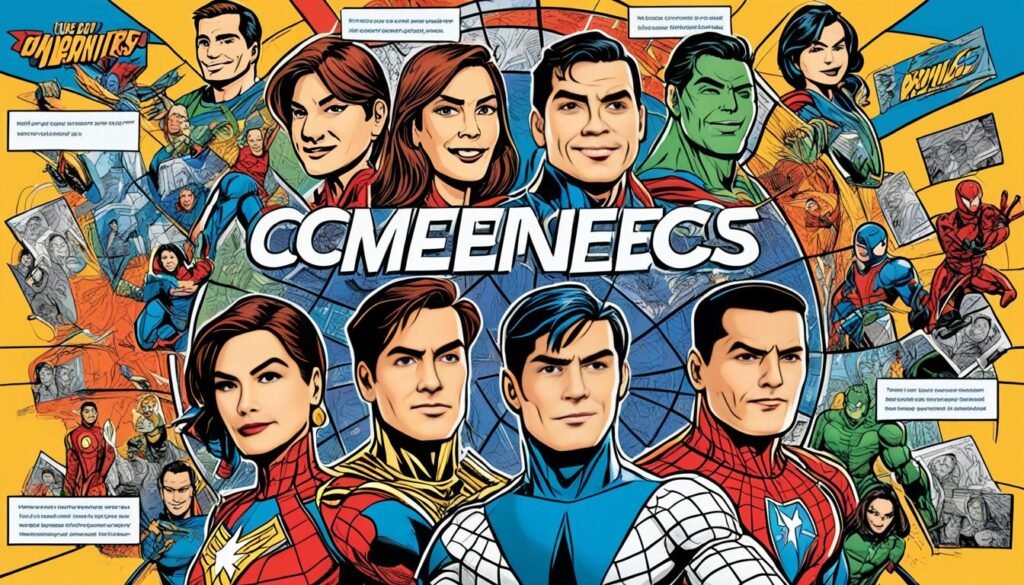
The Modern Hero: A Clash of Values and Legacy
In the Philippines, the idea of a modern hero is changing fast. New values and a look at the past are shaping this. As the country moves forward, people are rethinking what it means to be a hero.
Old heroes’ stories mix with today’s values, starting debates on what a hero is now. This clash is all about how we see heroism in today’s world.
People are asking: is being a hero only about being brave or making big sacrifices? Or does it also include those who stand up for what’s right today? This new idea of a hero is challenging old ideas, pushing us to see heroes in new, diverse ways.
“Heroism is not confined to a specific time or place. It is an ongoing journey of individuals who strive to make a positive difference in society.”
For more insight, check out this course on the National Heroes of the Philippines. It looks at how we decide who is a hero today, with all its complexities.
Thinking about heroes today raises questions on how we honor them. Maybe our traditional ways, like statues and holidays, need an update. We need to make sure we remember today’s heroes too.
To really value modern heroes, we must remember the mark they leave on our country. They continue to guide us, showing the values that Filipinos hold dear in this changing world.
Conclusion
Looking at the heroes of the Philippines shows how they’re all linked. Figures like Jose Rizal and Andres Bonifacio were key in the fight for freedom and defining who the nation is. Their work for freedom, fairness, and equal rights has had a lasting effect on the country.
It’s vital we honor these heroes to keep our national identity strong. We can gain wisdom and drive from their stories. They remind us of bravery, standing strong, and always fighting for liberty. This should always be what the Philippines stands for.
We should also remember those heroes who are not as well-known but still did a lot for our country. They too had a big part in building our nation. Their work in different areas has shaped Philippine life and deserves our thanks.
In the end, these heroes are a symbol of bravery, selflessness, and grit. Their unity and hard work show the power of working together for a common goal. By keeping their memories alive, we keep their powerful impact going, inspiring the people of the Philippines for years to come.
FAQ
Did Philippine heroes like Jose Rizal and Andres Bonifacio know each other?
Philippine heroes, including Rizal and Bonifacio, are known to have common goals. They fought for the country’s freedom but the depth of their personal connection remains debated.
Are there officially declared national heroes in the Philippines?
The Philippines has not officially named specific people as national heroes. However, individuals admired for their large contributions to the country’s history are widely recognized as such.
Who are Jose Rizal and Andres Bonifacio in Philippine history?
José Rizal was a key figure in the fight for freedom through his writings and ideas. Andres Bonifacio led the charge against the Spanish, seeking liberty and justice.
What are unsung heroes in Philippine history?
Unsung heroes are those whose efforts for the nation are not as well-known. They actively worked for the Philippines’ growth and made an impact on society.
How did Jose Rizal and Andres Bonifacio influence the Philippines?
Jose Rizal’s works spurred a nationalistic feeling in Filipinos, encouraging the fight for freedom. Andres Bonifacio organized a movement that aimed at liberating the Philippines.
What were the revolutionary affiliations of Philippine heroes?
Rizal and Bonifacio were involved in groups like the Katipunan and La Liga Filipina. These organizations supported their revolutionary efforts and shared their aims.
What were the personal lives of Jose Rizal like?
Jose Rizal was deeply involved in academia and literature. He greatly enhanced Philippine thinking and left a lasting legacy that influenced many.
What were the leadership qualities of Andres Bonifacio?
Andres Bonifacio’s strong leadership helped shape the Philippine revolution. He was a driving force in gaining independence through his charisma and dedication.
Did the paths of Jose Rizal and Andres Bonifacio ever intersect?
The interaction between Rizal and Bonifacio remains a question. Their mutual goals suggest a possible influence on each other, calling for further study.
How have the legacies of Philippine heroes impacted the nation?
The contributions of Rizal and Bonifacio, especially in literature and freedom fighting, are profound. They have deeply influenced the Philippines and its people.
How have heroes influenced Filipino culture and society?
Philippine heroes have greatly shaped the nation’s culture and spirit. Their bravery and ideals against oppression have become central to Filipino values and dreams.
What symbols represent courage and valor in Philippine history?
Rizal and Bonifacio stand as symbols of bravery and resilience. Their actions continue to be a source of inspiration for Filipinos, reminding them of their rich history.
How has the perception of heroes evolved over time?
Heroes and the idea of heroism have changed with society’s evolution. Today, what makes a hero and how they’re remembered has also evolved, reflecting modern challenges.
What is the role of modern heroes in the Philippines?
Modern heroes spark discussions on the changing nature of heroism and values. As the Philippines progresses, defining and celebrating new-age heroes evolves too.
Source Links
- https://philippines-atbp.jimdofree.com/philippine-heroes-heroines-b/
- https://www.slideshare.net/FrancheskaPaveCabund/rizal-other-heroespptx
- https://opinion.inquirer.net/156443/heroism

